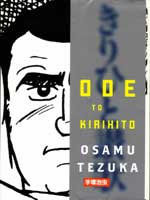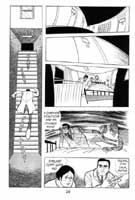[note: This review published at Toon Zone the week of this entry has been referenced by "Ode to Kirihito" publisher - Vertical. Specifically the company blog by Anne Ishii (Vertical's Marketing and Publishing director).]

I doubt few eyebrows would raise if I was to declare that we all live in "uncertain times." However, beyond the concerns of the upcoming global catastrophes, the political deceit, the uncontrolled growth of technology and of course, this generation's most profound question, just who will Britney Spears eventually settle down with, there is one definite certainty: we live in a world utterly swamped to it's teeth... with fiction.
This itself is a concern - maybe not as important to the world as global warming, or the question as to whether Big Brother is really good television, but one we all share at some level, even if we don't realize it.
It's not so much as to the quality of the said fiction, but the quantity. After all, we don't just have books, we have comics. We don't just have theater, we have cinema. We don't just have radio, we have television. No matter what your class, sex, religion or interest in Madonna's family plans, you are bound to have stories coming at you from left, right and center. With such a deluge, ideas, structures and outcomes are bound to overlap. In an age when fiction means money, we are bombarded mostly by stories made for the most lightweight brain and candlewick attention span.
So it's a delight to read something entirely different. I would call Ode to Kirhito, a graphic epic by manga grandfather Osamu Tezuka, just that: Different. The story, the structure and the atmosphere carves a tiny island in the torrents and fast moving rapids of vaguely-familiar-fiction.
First off, there is always something refreshing about reading any story from another culture, particularly one so distant to construction techniques of Western fiction. Those natural conventions of our own western story telling are broken by the whims of an eastern culture. I've always found Japanese fiction particularly fascinating in this respect; it doesn't follow the patterns I've been brought up to expect. Ode to Kirihito is a perfect example of such cultural difference in fiction being I've read nothing like it in western literature. In fact, it could indeed be one of the best stories you'll read - wherever you live in the world.

I would strongly recommend any new reader to Ode to Kirihito to go into this one blank. The less you know about Ode to Kirihito, the better. And with that, I'll explain what the book is about. So you might want to skip this next paragraph. Even better, just buy the book and skip the whole review. Trust me, I won't hold it against you.
A medical university in Japan is studying the effects of Monmow, a rare physical ailment that is yet to be quantified as either contagious pathogen or endemic. Politics begin to create an unfortunate mix with the search for facts as the need to explain the condition increases. The importance of Monmow becomes the very heart of a tale that blends tragedy and conspiracy into an epic story about the human condition. As Dr Kirhito Osanai investigates the origins of Monmow, he finds himself questioning the very medical legacy he's built his life on. In fact, he becomes the very subject of his own investigation...
If I may get straight to the point - to those who were not formerly aware - Ode to Kirhito is a classic piece of.. well, something. Without sounding melodramatic, I'm not sure how it's best defined. Certainly it's a "graphic novel," but in my humble opinion, it transcends the standard conventions of that medium. It is a very graphic story, but the pacing and flow of the tale, in relation to the balance of narrative to visuals, is more akin to a cinematic experience than a comic one. To transcend another media boundary, the graphic novel has the duration and patience in it's storytelling you'd find it a written book. Yes, it's a graphic novel by definition, but it feels like something more.
For instance, Osamu Tezuka had an ability to manipulate the reader's sense of time; the panel work in relation to size, position and context, manage to motivate the feel of pacing in a way that film does so well. It feels like a film, even though it's medium is comic book. Quite honestly, it's an incredible experience.
As for the all important artwork, the trappings of the genre are there in Tezuka's style - hardly surprising since he is considered as one of the "grandfathers" of Manga. However, there is far more to his work beyond the stylistic expectations of the Japanese comic medium. The "color" to his black and white work is, at times, staggering. He's an all important example to all wannabe "manga artists": that a style is by no means a definition of the artist. Tezuka's work delves into the manga style, but is not trapped by it. His work switches depending on the context of the story. You'll notice throughout the book that his art uses virtually no grayscale printing processes - the tones you'll find come from ink techniques; crosshatching, white out, ink marking. The style and complexity of the art varies depending on narratives requirements. This creates an unpredictable contrast between comic and traditional artwork, rendering makes each page a delight unto itself; you're never sure quite what the next page will offer.
Furthermore, the storyboarding is exceptional. Tezuka knew just how to draw the audience in - or pull them out - of a situation as he desired. His use of angles, panels and measured distances within his compositions help capture the mood and drive of the narrative. His sequenc
 es pull the audience around the environments as fluidly if they were following a camera.
es pull the audience around the environments as fluidly if they were following a camera.This is a big book over near 1000 pages and this makes the read even more involving. The story has no need to rush or force conclusions, it moves with a natural momentum.
If you are a Western reader with little experience of Japanese fiction, beware - you'll find it unconventional and unpredictable by your standards. It will confuse and occasionally it will shock. The story has no specific moral standards to adhere it's protagonists to and none of the characters are safe in Tezuka's hands. But that is the beauty of the book. It is unconventional and while contemporary fiction - particularly in comic books - enjoy attempting to shock their readers, few do it with such style and maturity.
If I was to pick out one particularly impressive element of the story, it must be the cultural observations that the book enjoys. Some of these comments are on Japanese culture, others are on how it relates to other cultures, or how the people of different cultures perceive the Japanese themselves. So often it seems the Japanese genre remains heavily contained within it's borders, often offering a skeptical eye on the rest of the world. Ode to Kirihito comes across as being a little more honest in it's perceptions of culture. In some respects, the story goes behind culture and looks at humanity itself, and to by what means we classify ourselves as "people;" just what expectations and presumptions make us people or create our role in society itself. Tezuka is not afraid of any religious commentary either, or the characteristics of faith in relation to the character. While heavily science fiction, like with all greats in his genre, it's root comes from human culture. All these observations intelligently interweave into each other as the story grows, giving the reader more to think upon that merely the events of the tale.
While graphic novels are a far more reputed medium than in previous years, it's a pity that stories like this don't get more prolific mainstream exposure. Those who read manga will undoubtedly know how good this book is, and how vital Tezuka was to the manga industry. However, I do feel that such a classic story deserves an even greater reverence. Who knows, maybe this western compilation will do just that, for this is an extremely well presented release of Ode to Kihihito. It's sure to look good on your bookshelf.
In fact, I wish I could offer a few negative criticisms about the book, but I found nothing that I felt didn't work within the tale. I'm certainly not going to go looking for nitpicks just for the sake of it. As far as I'm concerned, this is as near perfect as matters.
There are not many comic books of near a 1,000 pages that fill me with the desire to read more. There are not many books that could tempt me to perform a full frontal lobotomy with a pencil and cheese stick, just so I can have the pleasure of reading it again.
Read. Operate. Read it again. It's worth it.
